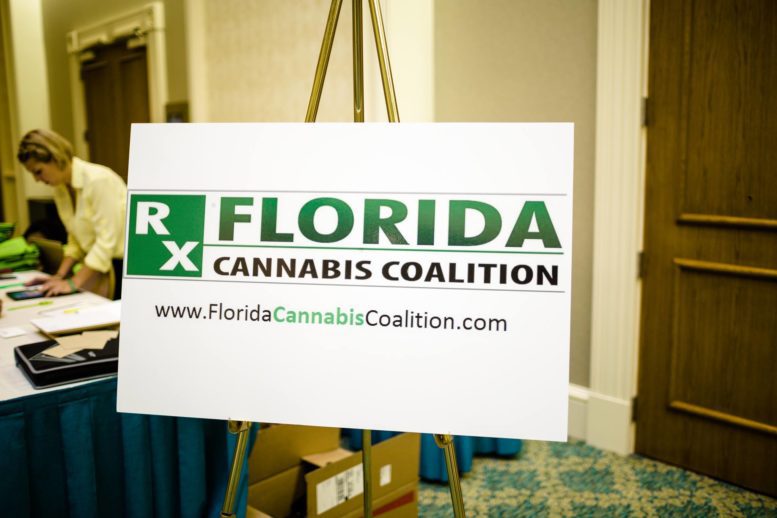With a sizable share of one of the nation’s fastest growing markets at stake, South Florida’s budding medical cannabis industry has become a crowded field of growers, lobbyists, investors, and vendors expecting big payoffs from a not-yet profitable business model.
The short-term regulatory, financial and entrepreneurial challenges facing the fledgling local industry remain, threatening its potential growth and ability to carve out a slice of nationwide sales estimated at $6 billion by 2020. For related businesses and physicians needing product, uncertainty still abounds.
While local growers and dispensaries have already planted their flags to share the bounty, others−including key financiers supporting the business−are growing reticent. Despite the hurdles, industry advocates compare the business potential to a runaway train fueled by demand that can’t be stopped.
On the economic front, the new industry will be a job creator, proclaimed Peter Sessa, co-founder and COO of the Tampa-based Florida Cannabis Association, a business advocacy group founded in 2014.
Recreational Cannabis a Boom Business
- Recent statistics from research group New Frontier estimate cannabis industry-related jobs nationwide between 250,000 and 300,000 by 2020.An estimated worldwide cash crop of between $150 and $200 billion for the cannabis industry already exists and has the potential to explode once recreational use is approved in Europe and all fifty U.S. states.
- Eight states (Alaska, California, Colorado, Maine, Massachusetts, Nevada, Oregon, Washington) and the District of Columbia have already legalized cannabis for recreational use.
A January 17 report by ArcView Market Research revealed consumers spent an estimated $53.3 billion on cannabis in the U.S. and Canada in 2016. The data included legal, illegal and medical markets.
“That entire industry is about to be legitimized,” said Florida Cannabis Association’s Peter Sessa. - But it remains an uphill fight. The green light for recreational use in the states where it has passed took years, even decades.
“Demand is already there,” said Sessa, whose group held an industry event at FIU in downtown Miami July 29. “When people on the state and national level start seeing the benefits, they can’t deny it. Look at all the different services that support this industry−software and packaging, for example−there is enormous potential for other industries to get into this business.”
But despite Florida’s legalization of medicinal marijuana last November, most banks currently dealing with the industry still only transact in cash.
Jitters of financial backers were underscored in a recent move by PNC Bank to shut down the decades-old bank accounts of the Marijuana Policy Project (MPP), a leading legalization organization amid federal scrutiny of states supporting legalizing the industry.
Some localities citing resident concerns, including Coral Gables and Miami Beach are already legislating to ban or limit dispensaries doing business in their cities.
Then there is confusion created by the rush of cultivators and investor groups populating a marketplace not yet framed by lawmakers. Venture capital and private equity groups have partnered with several growers to help capitalize hefty start up and expansion costs.
Florida initially approved five nurseries in November 2015 to grow and distribute legalized medical marijuana. In Miami-Dade County, Miami’s Costa Farms won the bid for the Southeast Region.
That number of cultivators has increased to seven, as the potential patient count has grown from an estimated 1,200 to a half million with new qualifiers over the next five years, according to Sessa.
Modern Health Concepts, Costa’s cannabis cultivation and distribution affiliate is banking on its position as Miami’s only current source for medicinal product.
The company is planning operations throughout the state and has teamed up with PalliaTech Inc., a Mass.-based investor group to spur “operational and financial strength,” according to the South Florida Sun Sentinel, citing a January news release.
The company replied to a request for an interview with CEO Richard Young in an email.
“Mr. Young is no longer with the company,” wrote Flor Santiesteba, Modern Health Concept’s director of sales and marketing. The circumstances of Young’s departure were not disclosed. A call requesting additional comment was not returned.
Young out, Roberts in as Modern Health Concepts CEO
- Richard Young of Costa Farm’s cannabis cultivation and distribution affiliate Modern Health Concepts is no longer at the helm as the company’s chief executive. He has been replaced as CEO by food and beverage executive, Gregg Roberts, according to the company’s web site.Flor Santiesteba, the company’s director of sales and marketing said in an email that Young was no longer with the company. She did not disclose the circumstances of Young’s departure. He had been with the company as recently as April. A call requesting additional comment was not returned.
- With a background in banking, finance, private equity, and health care, Young has guided Modern Health Concepts’ post-licensing operations and creation of medicine in 2016. Roberts became the company’s CEO in June, according to his LinkedIn profile. His experience includes positions as COO and Executive VP – Operations, Shasta Beverages, Inc. in Jacksonville.
- Modern Health Concepts−a leader in the field−is poised to dominate the industry as Miami’s only licensed grower and recently announced plans to distribute product statewide.
- The company has close to $350,000 in legislative campaign contributions for the 2016 and 2018 election cycles-nearly three times more than the next biggest growers in the field, including Sunterra and its nursery partner Alpha Foilage in Homestead.
- Costa Farms could not be reached for comment.
- Costa Farms is being acquired by publicly-traded venture capital company Markel Corp (NYSE: MKL), according to a July 26 news release. The deal is expected to close in the third quarter of 2017.
According to the company’s web site, the new CEO is Gregg Roberts, a food and beverage executive whose focus was “on delivering the highest safety and quality product standards.” He was hired as CEO in June, according to his LinkedIn profile.
While the market potential appears unlimited, the cost of admission into the industry is already prohibitive for businesses, said Sessa, with start up costs for cultivators upwards of $5 million the first year.
“There is never any short term profits. It’s all a long play, especially when looking at Florida. The start-up costs are tremendous.”
That’s limiting the number of viable players in the space. The way Sessa sees it, the more competition, the better.
“People are not taking [high start-up costs] into account,” Sessa said. “It looks very sexy but you really have to step back and look at it in like any other business. You need substantial capital. It’s a vertical industry, an all in one funnel to grow and distribute. While it’s easier to regulate, the disadvantages of it is not having enough players in the game to foster the quality product that you need. When you diminish the competition, you are going to diminish the quality of the product and in this case it’s medicine.”
Sessa may get his wish.
Even more licenses could be inked after the Florida legislature in a special session provided for the issuance of ten new licenses, in addition to the existing seven. Senate Bill 8A also expands the number of medical conditions that can be treated. Gov. Rick Scott signed off on the constitutional amendment June 28, making it law.
A measure is also afoot to establish the right to treat a broader range of conditions with medical cannabis, led by attorney John Morgan and his group, United for Care.
Despite the positive momentum, Sessa sees another big obstacle to growth: lobbyists, including those for Big Pharma, have their own business and political agendas when it comes to medicinal cannabis.
“You still have this mentality that it has to be a prescription [drug], that it has to be clinical. They don’t study nutrition—the pharmaceutical industry doesn’t want people using this stuff.”
For the hundreds of doctors in Florida licensed to dispense medical marijuana, the stakes of how it all shakes out could not be higher for their ailing patients.
Aventura dermatologist Barry Resnik, M.D. said he’s a big believer in CDB, an oil derived from the plant as an effective medicine for pain relief. He is certified by the state to write medical cannabis prescriptions, and won’t hesitate to do so once his practice is set up for it.
“A lot of my patients have to deal with pain everyday,” he said. “I send them to pain management specialists. They are accessing CDB from different sources and getting good results. It helps that I will be able to manage that aspect at well.”
Dr. Resnik is most concerned with diseases that cause the most pain, as well as avoiding the dependency that comes from treating chronic diseases with opioids alone.
“The goal is to not to take narcotics. The longer you take it, the longer you stay on it. CDB has much fewer side effects, if any at all. The risk/reward benefit is palpable.”









